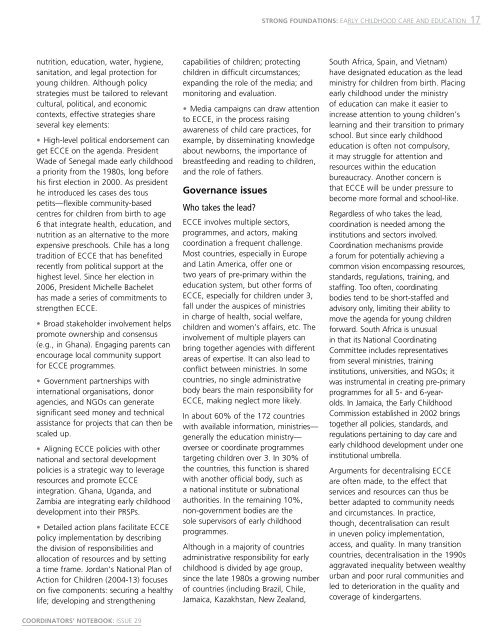A global call to action for early childhood
A global call to action for early childhood
A global call to action for early childhood
You also want an ePaper? Increase the reach of your titles
YUMPU automatically turns print PDFs into web optimized ePapers that Google loves.
Strong foundations: Early <strong>childhood</strong> care and education<br />
17<br />
nutrition, education, water, hygiene,<br />
sanitation, and legal protection <strong>for</strong><br />
young children. Although policy<br />
strategies must be tailored <strong>to</strong> relevant<br />
cultural, political, and economic<br />
contexts, effective strategies share<br />
several key elements:<br />
• High-level political endorsement can<br />
get ECCE on the agenda. President<br />
Wade of Senegal made <strong>early</strong> <strong>childhood</strong><br />
a priority from the 1980s, long be<strong>for</strong>e<br />
his first election in 2000. As president<br />
he introduced les cases des <strong>to</strong>us<br />
petits—flexible community-based<br />
centres <strong>for</strong> children from birth <strong>to</strong> age<br />
6 that integrate health, education, and<br />
nutrition as an alternative <strong>to</strong> the more<br />
expensive preschools. Chile has a long<br />
tradition of ECCE that has benefited<br />
recently from political support at the<br />
highest level. Since her election in<br />
2006, President Michelle Bachelet<br />
has made a series of commitments <strong>to</strong><br />
strengthen ECCE.<br />
• Broad stakeholder involvement helps<br />
promote ownership and consensus<br />
(e.g., in Ghana). Engaging parents can<br />
encourage local community support<br />
<strong>for</strong> ECCE programmes.<br />
• Government partnerships with<br />
international organisations, donor<br />
agencies, and NGOs can generate<br />
significant seed money and technical<br />
assistance <strong>for</strong> projects that can then be<br />
scaled up.<br />
• Aligning ECCE policies with other<br />
national and sec<strong>to</strong>ral development<br />
policies is a strategic way <strong>to</strong> leverage<br />
resources and promote ECCE<br />
integration. Ghana, Uganda, and<br />
Zambia are integrating <strong>early</strong> <strong>childhood</strong><br />
development in<strong>to</strong> their PRSPs.<br />
• Detailed <strong>action</strong> plans facilitate ECCE<br />
policy implementation by describing<br />
the division of responsibilities and<br />
allocation of resources and by setting<br />
a time frame. Jordan’s National Plan of<br />
Action <strong>for</strong> Children (2004-13) focuses<br />
on five components: securing a healthy<br />
life; developing and strengthening<br />
capabilities of children; protecting<br />
children in difficult circumstances;<br />
expanding the role of the media; and<br />
moni<strong>to</strong>ring and evaluation.<br />
• Media campaigns can draw attention<br />
<strong>to</strong> ECCE, in the process raising<br />
awareness of child care practices, <strong>for</strong><br />
example, by disseminating knowledge<br />
about newborns, the importance of<br />
breastfeeding and reading <strong>to</strong> children,<br />
and the role of fathers.<br />
Governance issues<br />
Who takes the lead?<br />
ECCE involves multiple sec<strong>to</strong>rs,<br />
programmes, and ac<strong>to</strong>rs, making<br />
coordination a frequent challenge.<br />
Most countries, especially in Europe<br />
and Latin America, offer one or<br />
two years of pre-primary within the<br />
education system, but other <strong>for</strong>ms of<br />
ECCE, especially <strong>for</strong> children under 3,<br />
fall under the auspices of ministries<br />
in charge of health, social welfare,<br />
children and women’s affairs, etc. The<br />
involvement of multiple players can<br />
bring <strong>to</strong>gether agencies with different<br />
areas of expertise. It can also lead <strong>to</strong><br />
conflict between ministries. In some<br />
countries, no single administrative<br />
body bears the main responsibility <strong>for</strong><br />
ECCE, making neglect more likely.<br />
In about 60% of the 172 countries<br />
with available in<strong>for</strong>mation, ministries—<br />
generally the education ministry—<br />
oversee or coordinate programmes<br />
targeting children over 3. In 30% of<br />
the countries, this function is shared<br />
with another official body, such as<br />
a national institute or subnational<br />
authorities. In the remaining 10%,<br />
non-government bodies are the<br />
sole supervisors of <strong>early</strong> <strong>childhood</strong><br />
programmes.<br />
Although in a majority of countries<br />
administrative responsibility <strong>for</strong> <strong>early</strong><br />
<strong>childhood</strong> is divided by age group,<br />
since the late 1980s a growing number<br />
of countries (including Brazil, Chile,<br />
Jamaica, Kazakhstan, New Zealand,<br />
South Africa, Spain, and Vietnam)<br />
have designated education as the lead<br />
ministry <strong>for</strong> children from birth. Placing<br />
<strong>early</strong> <strong>childhood</strong> under the ministry<br />
of education can make it easier <strong>to</strong><br />
increase attention <strong>to</strong> young children’s<br />
learning and their transition <strong>to</strong> primary<br />
school. But since <strong>early</strong> <strong>childhood</strong><br />
education is often not compulsory,<br />
it may struggle <strong>for</strong> attention and<br />
resources within the education<br />
bureaucracy. Another concern is<br />
that ECCE will be under pressure <strong>to</strong><br />
become more <strong>for</strong>mal and school-like.<br />
Regardless of who takes the lead,<br />
coordination is needed among the<br />
institutions and sec<strong>to</strong>rs involved.<br />
Coordination mechanisms provide<br />
a <strong>for</strong>um <strong>for</strong> potentially achieving a<br />
common vision encompassing resources,<br />
standards, regulations, training, and<br />
staffing. Too often, coordinating<br />
bodies tend <strong>to</strong> be short-staffed and<br />
advisory only, limiting their ability <strong>to</strong><br />
move the agenda <strong>for</strong> young children<br />
<strong>for</strong>ward. South Africa is unusual<br />
in that its National Coordinating<br />
Committee includes representatives<br />
from several ministries, training<br />
institutions, universities, and NGOs; it<br />
was instrumental in creating pre-primary<br />
programmes <strong>for</strong> all 5- and 6-yearolds.<br />
In Jamaica, the Early Childhood<br />
Commission established in 2002 brings<br />
<strong>to</strong>gether all policies, standards, and<br />
regulations pertaining <strong>to</strong> day care and<br />
<strong>early</strong> <strong>childhood</strong> development under one<br />
institutional umbrella.<br />
Arguments <strong>for</strong> decentralising ECCE<br />
are often made, <strong>to</strong> the effect that<br />
services and resources can thus be<br />
better adapted <strong>to</strong> community needs<br />
and circumstances. In practice,<br />
though, decentralisation can result<br />
in uneven policy implementation,<br />
access, and quality. In many transition<br />
countries, decentralisation in the 1990s<br />
aggravated inequality between wealthy<br />
urban and poor rural communities and<br />
led <strong>to</strong> deterioration in the quality and<br />
coverage of kindergartens.<br />
COORDINATORS’ NOTEBOOK: ISSUE 29
















